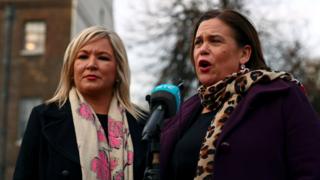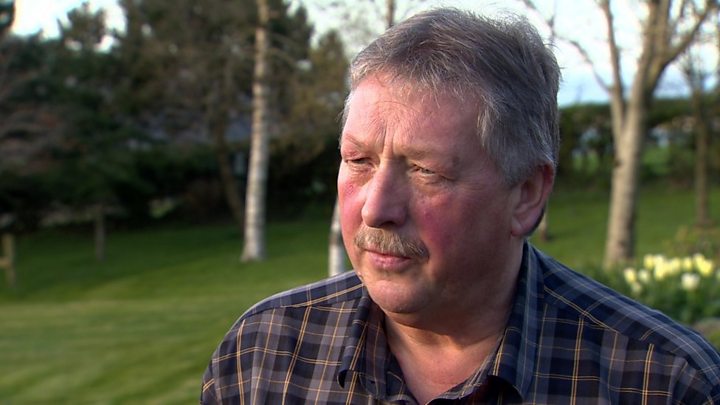Brexit: Sinn Féin leaders to meet EU's Michel Barnier
 Image copyright
Reuters
Image copyright
Reuters
Sinn Féin will head to Brussels to meet EU officials later as MPs seek to break the Brexit deadlock at Westminster.
The party's leadership - Mary Lou McDonald and Michelle O'Neill - will meet the EU's chief Brexit negotiator Michel Barnier.
It comes as Parliament prepares for a second round of indicative votes, exploring alternatives to Prime Minister Theresa May's Brexit deal.
It is not clear if the DUP will vote for any of the tabled options.
Speaking to the BBC's Good Morning Ulster programme on Monday, Sinn Féin's Michelle O'Neill said the DUP "continue to be on the wrong side of the argument" in terms of Brexit.
Ahead of their meeting with Michel Barnier and Guy Verhofstadt, Ms O'Neill said, like previous engagements, they would be focused on "the need to protect the primacy of the Good Friday Agreement".
"Member states have promised to avoid a hard border even in the context of a no-deal," she said.
"They have a commitment to withhold the integrity of the customs union and the single market if there is a crash-out Brexit so we want to explore that with Michel Barnier - how they're going to protect the island of Ireland, the interests of the people of Ireland and to work to ensure there's no return of a hard border in Ireland."
Eight options
Monday's votes at Westminster are non-binding, but the intention is to see what outcome, if any, commands a majority.
The DUP's Sammy Wilson said on Sunday night that his party would not vote for Theresa May's Brexit deal even if she presented it to the House of Commons "a thousand times".

Speaking to BBC News NI, he said the party's position was fixed.
None of MPs' eight proposed options secured a majority in the first set of indicative votes on 27 March but those that received the most were a customs union with the EU and a referendum on any deal.
MPs who back the Common Market 2.0 proposal have been engaged in talks with the DUP to try and persuade the party's 10 MPs to back it on Monday.
Labour's Stephen Kinnock told BBC News NI that discussions with the party had continued over the weekend.
Last week, the party abstained on that motion but voted against others, including holding a confirmatory referendum on any deal, revoking Article 50 as a last resort and staying in the customs union.
On Friday, the DUP's deputy leader Nigel Dodds said he would prefer to "remain in the EU rather than risk Northern Ireland's position" in the union.
What is Common Market 2.0?
Tabled by Conservative MP Nick Boles, it would see the UK keep a close relationship with the EU by staying in the European Economic Area (EEA) and joining the European Free Trade Area (EFTA).
EFTA members have to follow the four freedoms of the single market - freedom of movement of goods, services, capital and people.
But MPs promoting Common Market 2.0 have suggested that EFTA rules could allow freedom of movement to be restricted.
The UK would also commit to joining a customs union with the EU.
Together, these would be enough to supersede the Northern Irish backstop, which would not come into force if the future relationship was negotiated in time.
It would not get rid of the backstop from the withdrawal agreement - only, in the opinion of its supporters, make it less likely that it would be needed or endure beyond the agreement of the new trade relationship.
The DUP has not ruled out supporting a "soft Brexit" but it is not clear how its MPs will vote on Monday.
It has stressed that the Irish border backstop in the government's deal breaches the party's one red line, when it comes to Northern Ireland being treated differently from Great Britain.
It has argued that any differences could pose a risk to the future of the union of the UK.
The UK is scheduled to leave the EU on 12 April, after MPs again rejected the withdrawal agreement negotiated by Mrs May.
The EU had said the UK needed to approve the withdrawal agreement by 29 March in order to grant a short extension until 22 May.
On Sunday, former prime minister Sir John Major warned that a no-deal Brexit would lead to the break-up of the UK.
Justice Secretary David Gauke also echoed calls by other cabinet ministers that no deal would lead to the reintroduction of direct rule in Northern Ireland.
What next?
Monday, 1 April: MPs hold another set of votes on Brexit options to see if they can agree on a way forward
Wednesday, 3 April: Potentially another round of so-called indicative votes
Wednesday, 10 April: Emergency summit of EU leaders to consider any UK request for further extension
Friday, 12 April: Brexit day if UK does not seek/EU does not grant further delay
23-26 May: European Parliamentary elections